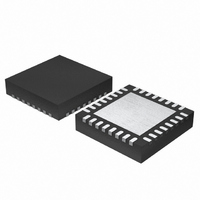DF38602RFT10 Renesas Electronics America, DF38602RFT10 Datasheet - Page 339

DF38602RFT10
Manufacturer Part Number
DF38602RFT10
Description
MCU 3V 16K 32-QFN
Manufacturer
Renesas Electronics America
Series
H8® H8/300H SLPr
Datasheet
1.DF38602RFT10.pdf
(554 pages)
Specifications of DF38602RFT10
Core Processor
H8/300H
Core Size
16-Bit
Speed
10MHz
Connectivity
I²C, IrDA, SCI, SSU
Peripherals
POR, PWM, WDT
Number Of I /o
13
Program Memory Size
16KB (16K x 8)
Program Memory Type
FLASH
Ram Size
1K x 8
Voltage - Supply (vcc/vdd)
2.7 V ~ 3.6 V
Data Converters
A/D 6x10b
Oscillator Type
Internal
Operating Temperature
-20°C ~ 75°C
Package / Case
32-QFN
Lead Free Status / RoHS Status
Contains lead / RoHS non-compliant
Eeprom Size
-
Other names
HD64F38602RFT10
HD64F38602RFT10
HD64F38602RFT10
Available stocks
Company
Part Number
Manufacturer
Quantity
Price
Company:
Part Number:
DF38602RFT10V
Manufacturer:
Renesas Electronics America
Quantity:
135
- Current page: 339 of 554
- Download datasheet (4Mb)
Section 15 Synchronous Serial Communication Unit (SSU)
15.4.8
Serial Data Transmission
Figure 15.11 shows an example of the SSU operation for transmission. In serial transmission, the
SSU operates as described below.
When the SSU is set as a master device, it outputs a synchronous clock and data. When the SSU is
set as a slave device, the SCS pin is in the low-input state and the SSU outputs data in
synchronized with the input clock.
When the SSU writes transmit data in SSTDR after setting the TE bit to 1, the TDRE flag is
automatically cleared to 0 and data is transferred from SSTDR to SSTRSR. Then the SSU sets the
TDRE flag to 1 and starts transmission. If the TIE bit in SSER is set to 1 at this time, a TXI is
generated.
When the TDRE flag is 0 and one frame of data has transferred, data is transferred from SSTDR to
SSTRSR and serial transmission of the next frame is started. If the eighth bit is transmitted while
the TDRE flag is 1, the TEND bit in SSSR is set to 1 and the state is retained. If the TEIE bit in
SSER is set to 1 at this time, a TEI is generated. After transmission is ended, the SSCK pin is
fixed high and the SCS pin goes high. When continuous transmission is performed with the SCS
pin low, the next data should be written to SSTDR before transmitting the eighth bit of the frame.
While the ORER bit in SSSR is set to 1, transmission cannot be performed. Therefore confirm that
the ORER bit is cleared to 0 before transmission.
The difference between this mode and clocked synchronous communication mode is as follows:
when the SSU is set as a master device, the SSO pin is in the Hi-Z state if the SCS pin is in the Hi-
Z state and when the SSU is set as a slave device, the SSI pin is in the Hi-Z state if the SCS pin is
in the high-input state. The sample flowchart for serial data transmission is the same as that in
clocked synchronous communication mode.
Rev. 3.00 May 15, 2007 Page 305 of 518
REJ09B0152-0300
Related parts for DF38602RFT10
Image
Part Number
Description
Manufacturer
Datasheet
Request
R

Part Number:
Description:
KIT STARTER FOR M16C/29
Manufacturer:
Renesas Electronics America
Datasheet:

Part Number:
Description:
KIT STARTER FOR R8C/2D
Manufacturer:
Renesas Electronics America
Datasheet:

Part Number:
Description:
R0K33062P STARTER KIT
Manufacturer:
Renesas Electronics America
Datasheet:

Part Number:
Description:
KIT STARTER FOR R8C/23 E8A
Manufacturer:
Renesas Electronics America
Datasheet:

Part Number:
Description:
KIT STARTER FOR R8C/25
Manufacturer:
Renesas Electronics America
Datasheet:

Part Number:
Description:
KIT STARTER H8S2456 SHARPE DSPLY
Manufacturer:
Renesas Electronics America
Datasheet:

Part Number:
Description:
KIT STARTER FOR R8C38C
Manufacturer:
Renesas Electronics America
Datasheet:

Part Number:
Description:
KIT STARTER FOR R8C35C
Manufacturer:
Renesas Electronics America
Datasheet:

Part Number:
Description:
KIT STARTER FOR R8CL3AC+LCD APPS
Manufacturer:
Renesas Electronics America
Datasheet:

Part Number:
Description:
KIT STARTER FOR RX610
Manufacturer:
Renesas Electronics America
Datasheet:

Part Number:
Description:
KIT STARTER FOR R32C/118
Manufacturer:
Renesas Electronics America
Datasheet:

Part Number:
Description:
KIT DEV RSK-R8C/26-29
Manufacturer:
Renesas Electronics America
Datasheet:

Part Number:
Description:
KIT STARTER FOR SH7124
Manufacturer:
Renesas Electronics America
Datasheet:

Part Number:
Description:
KIT STARTER FOR H8SX/1622
Manufacturer:
Renesas Electronics America
Datasheet:

Part Number:
Description:
KIT DEV FOR SH7203
Manufacturer:
Renesas Electronics America
Datasheet:











